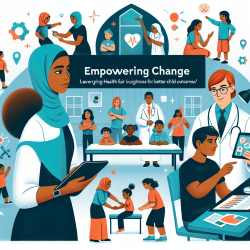Introduction
In the realm of speech-language pathology and child development, the importance of community health initiatives cannot be overstated. Recent research, particularly the study titled Analysis of a Community Health Screening Program and the Factors Affecting Access to Care, provides valuable insights into how health fairs can improve access to care and health outcomes, especially in underserved communities. This blog will explore how practitioners can leverage these insights to enhance their skills and contribute to better outcomes for children.
Key Findings from the Research
The study, conducted by UTHealthCares, evaluated a community health fair in the Eastex-Jensen area, a medically underserved region in Northeast Houston. The health fair included various stations such as vitals and body mass index collection, vision screening, blood glucose screening, and dental screening. Participants also received COVID-19 vaccinations, referrals, and health education.
Key findings from the study include:
- High satisfaction rates among participants, with an average rating of 4.62 out of 5.
- Participants reported improved comfort in managing health areas related to the fair's offerings.
- The lack of insurance and high costs were the primary barriers to accessing care, rather than transportation issues.
- Participants with health insurance were more likely to visit a medical provider when needed.
Implications for Practitioners
For practitioners, these findings highlight the importance of addressing barriers to care, such as insurance access and cost, in community health initiatives. By understanding these barriers, practitioners can better tailor their interventions to meet the needs of underserved populations.
Here are some actionable steps practitioners can take:
- Advocate for Insurance Education: Educate families about available low-cost insurance options and financial assistance programs, which can significantly improve access to care.
- Expand Health Education: Incorporate comprehensive health education into community programs to empower families with the knowledge needed to manage their health effectively.
- Collaborate with Community Resources: Partner with local organizations to provide holistic support, addressing not only medical needs but also social determinants of health such as access to fresh food.
Encouraging Further Research
The study's findings also underscore the need for ongoing research to explore how community health initiatives can be optimized. Practitioners are encouraged to engage in further research to understand the unique needs of their communities better and to develop innovative solutions that address these needs.
Conclusion
Community health fairs, as demonstrated by the UTHealthCares initiative, are a powerful tool for improving access to care and health outcomes in underserved areas. By addressing the barriers identified in the study, practitioners can enhance their impact and contribute to better health outcomes for children and families.
To read the original research paper, please follow this link: Analysis of a Community Health Screening Program and the Factors Affecting Access to Care.










